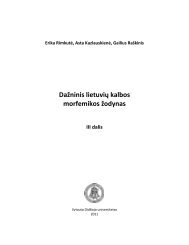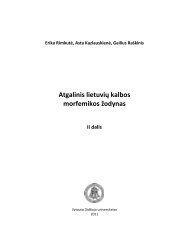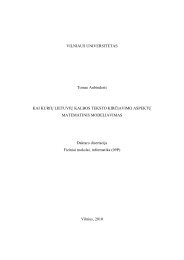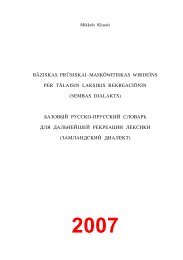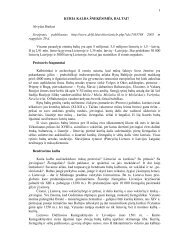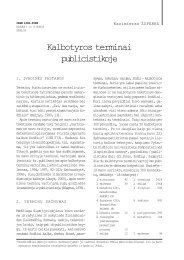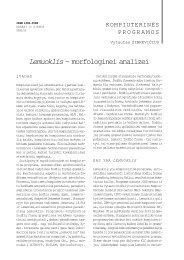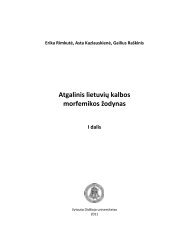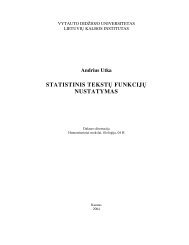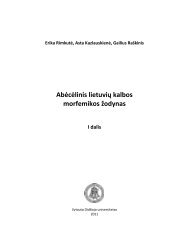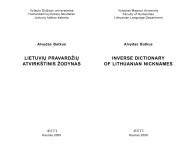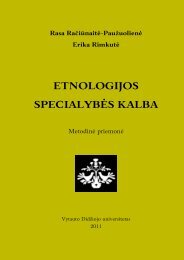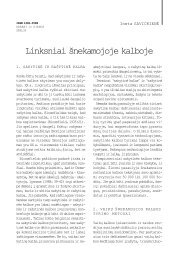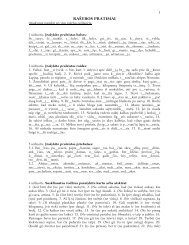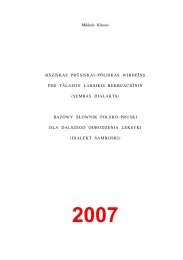HISTORICAL GRAMMAR OF OLD PRUSSIAN
HISTORICAL GRAMMAR OF OLD PRUSSIAN
HISTORICAL GRAMMAR OF OLD PRUSSIAN
You also want an ePaper? Increase the reach of your titles
YUMPU automatically turns print PDFs into web optimized ePapers that Google loves.
42<br />
V. Maþiulis<br />
dumis = *dûmis ‘smoke’, caymis = *kaimis ‘village’, etc.<br />
In the Catechisms an ending -s is usual, e.g.: Deiws (III) ‘God’, t`ws<br />
(III) ‘father’, wijrs (III) ‘man’ etc. Three times an ending -as occurs: Deiwas<br />
(III 99 ), tawas (III 47 ) 14 2, 10 33 .<br />
Note: An inflection nom. -as in l`iskas (III) ‘book’ is an `-stem<br />
feminine plural, not (as usually considered) an a-stem masculine singular,<br />
cf. PEÞ III 28.<br />
* 90. Nom.-acc. sg. neut. Balt. *-an (cf. PEÞ III 50 f. s.v. salta)<br />
--> Pr. *-an, well preserved in dialects of (E): assaran = *azaran ‘lake’,<br />
buttan ‘house (home)’, dalptan ‘chisel’ (cf. Ch.Sl.Rus. dlato ‘idem’), creslan<br />
‘arm-chair’ (cf. OSl. kr‰eslo ‘idem’), lunkan ‘bast’ (cf. OSl. lyko), etc.<br />
Cf. fewer in the Catechisms: buttan (III) = butten (II) ‘house (home)’,<br />
gîwan (III) ‘life’, wargan (III) ‘evil’, testamentan (I) ‘testament’ vs. masc.<br />
testaments (III) ‘idem’, etc.<br />
* 91. Gen. sg. (masc., neut.) *-as is attested in all Catechisms, e.g.<br />
(III): Deiwas ‘God’, buttas ‘house (home)’, gîwas ‘life’, grîkas ‘sin’, etc.<br />
The origin of this form was searched for in Pr. `-stem gen. sg. (fem.) *-`s<br />
(Leskien Deklin. 31, Berneker PS 186). According to a more popular<br />
hypothesis, (Deiw)-as goes back to WBalt. *-as(Ù)a (van Wijk Ap. St.<br />
77, Trautmann AS 216, Endzelîns SV 58, Stang Vergl. Gr. 181,<br />
Kazlauskas LKIG 173 f., Gamkrelidze–Ivanov I 387 f.).<br />
I think that a-stem Pr. gen. sg. masc.-neut. -as points to IE *-‹os<br />
33 Cf. also adj. nom. sg. masc. -skas (isarwiskas III, etc.), not shortened due to difficulty in<br />
pronouncing complex o-sks, or ord. pirmas (I, Gr) ‘first’, not shortened because of the complex<br />
o-rms. All this points to considerably late differentiation of nom. -as and gen. -as in Prussian,<br />
i.e. to a “pre-accusative” syntactical structure of Common Prussian (Palmaitis BGR 115).<br />
For the purpose of shortening Pr. nom. *-as > -s cf. also ftn. 47.<br />
34 Thematization (sic! BS 247) of IE consonant-stem (“athematic”!) *-es /*-os (with the same<br />
usual vowel-gradation *e /*o, as in gen. sg. masc. Pr. -as = Grmc *-es) was first explained in<br />
Palmaitis BGR 40/41, 78 f., and even 19 years earlier in Ïàëìàéòèñ Ì.Ë. Èíäîåâðîïåéñêàÿ<br />
àïîôîíèÿ è ðàçâèòèå äåêëèíàöèîííûõ ìîäåëåé â äèàõðîííî-òèïîëîãè÷åñêîì<br />
àñïåêòå / Èçäàòåëüñòâî Òáèëèññêîãî óíèâåðñèòåòà, 1979. All these ideas were<br />
highly appreciated by A. Desnitskaya who wrote: “Author heaps up hypotheses into a complex<br />
construction which, upon his mind, is able to solve all problems of Indoeuropean linguistics”



